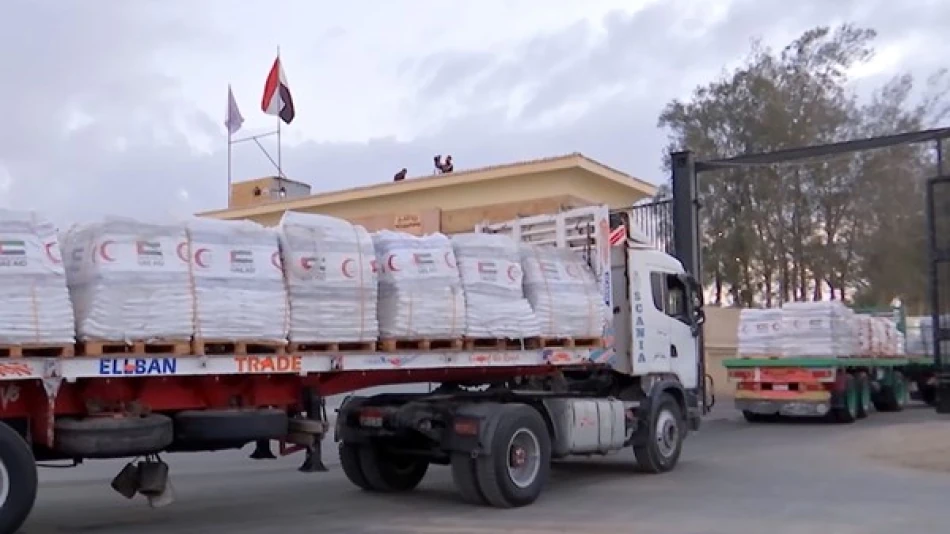
UAE Delivers Over 10,000 Tons of Aid to Gaza as Border Crossings Reopen
UAE Doubles Down on Gaza Relief as Humanitarian Crisis Deepens
The United Arab Emirates has intensified its humanitarian response to Gaza's crisis, delivering over 2,376 tons of essential supplies through five aid convoys this week alone via Egypt's Rafah crossing. This surge in assistance, part of the UAE's "Noble Knight 3" operation, brings total Emirati aid to Gaza beyond 10,000 tons since border crossings reopened, positioning the Gulf nation as a leading humanitarian actor in the Palestinian territories.
Strategic Humanitarian Positioning
The UAE's escalation of aid deliveries since the recent truce reflects a calculated approach to Middle Eastern diplomacy. By channeling assistance through Egypt's Rafah crossing, the Emirates leverages its strong bilateral ties with Cairo while avoiding direct engagement with more contentious political actors in the region.
The 100-truck convoy system demonstrates operational sophistication, with Emirati humanitarian teams stationed in Egypt's Al-Arish city to oversee precise loading and delivery coordination. This hands-on approach ensures aid reaches intended recipients while maintaining the UAE's reputation for efficient disaster response.
Beyond Emergency Relief
The comprehensive nature of UAE assistance—spanning food, medical supplies, and shelter materials—suggests a long-term commitment rather than symbolic gesturing. This mirrors the Emirates' humanitarian strategy in other regional crises, including Yemen and Syria, where it has consistently provided substantial material support alongside diplomatic initiatives.
Regional Implications and Precedent
The UAE's humanitarian leadership in Gaza serves multiple strategic purposes. It reinforces Abu Dhabi's position as a responsible regional power while demonstrating practical solidarity with Palestinian civilians. This approach allows the Emirates to maintain its normalization agreements with Israel while addressing Arab public opinion concerns about Palestinian welfare.
Compared to other Gulf states, the UAE's systematic approach—complete with dedicated operations teams and transparent tonnage reporting—sets a higher standard for regional humanitarian engagement. The "Noble Knight" branding also reflects the Emirates' preference for institutionalizing aid programs rather than ad-hoc responses.
Operational Challenges and Sustainability
The scale of current deliveries raises questions about long-term sustainability and absorption capacity within Gaza. With infrastructure severely damaged, the effectiveness of even well-coordinated aid depends heavily on distribution networks and storage facilities that may be compromised.
The UAE's emphasis on supporting "the most vulnerable groups" suggests targeted distribution strategies, though the actual mechanisms for ensuring aid reaches intended populations remain unclear given Gaza's complex governance situation.
Diplomatic Dividends
For the UAE, this humanitarian surge offers diplomatic benefits across multiple audiences. It demonstrates responsible regional leadership to international partners, shows solidarity with Palestinian civilians to Arab populations, and maintains constructive engagement with Egypt as a key strategic ally.
The timing and scale of these deliveries position the Emirates as an indispensable humanitarian actor, potentially enhancing its influence in future political negotiations while building goodwill that could prove valuable for broader regional stability initiatives.
Most Viewed News

 Layla Al Mansoori
Layla Al Mansoori






